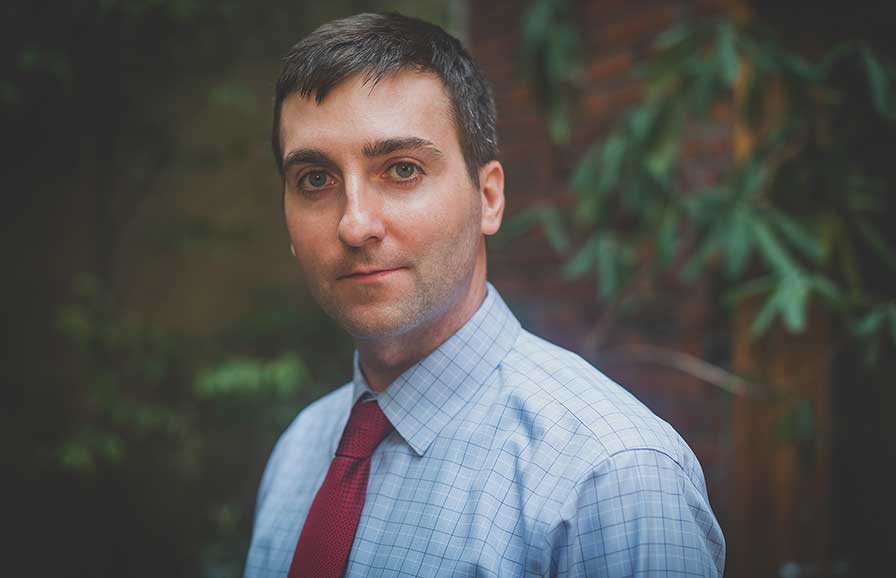Where Are They Now? Ryan Lynch, MD

Dr. Ryan Lynch is a hematologist-oncologist at Fred Hutchinson Cancer Center.
When did you become interested in the study of medicine? In lymphoma specifically?
I had a great opportunity while I was in my residency at Washington University in St. Louis to work on a project
examining outcomes of older patients with diffuse large B-cell lymphoma under the mentorship of Dr. Ken Carson. I had further mentorship during my hemeonc fellowship at Stanford working under Dr. Ranjana Advani. While at Stanford, I was able to work with one of the legends of the field, Dr. Saul Rosenberg. While he was among the pioneers in the field who cured the first patients with Hodgkin lymphoma, he recognized the later effects of treatment and spent the later parts of his career investigating less toxic regimens that would still maintain the high cure rates. I also met at Stanford current collaborators, Dr. Ash Alizadeh and Dr. David Kurtz, who have been instrumental in recent years in advancing minimal residual disease testing and non-invasive genotyping in lymphomas.
At what point in your career did you receive funding from the Lymphoma Research Foundation (LRF)? What kind of grant(s) did you receive?
I was lucky to have great mentorship at my current position at the University of Washington/Fred Hutch Cancer Center. In the summer before I started my first faculty position in 2017, my current mentor, Dr. Ajay Gopal, introduced me to the Lymphoma Research Foundation Mentoring Programs. I was fortunate to get an application together before I even set foot on campus and was accepted into the program in Spring 2018. After learning more about LRF through this program, I put together an LRF Career Development Award application in 2019, which was accepted.
What scientific project did you pursue as part of your LRF research grant(s)?
For my mentorship program project, I had designed a clinical trial to add the PI3K inhibitor umbralisib to
pembrolizumab for relapsed/refractory classical Hodgkin lymphoma. For my Career Development Award, I
investigated better ways to use checkpoint inhibitors, like pembrolizumab, in untreated patients with Hodgkin
lymphoma in combination with chemotherapy. Since these drugs can lead to false positive scan results, we also
investigated various alternative approaches like metabolic tumor volumes as well as circulating tumor DNA.
How has the treatment landscape for lymphoma/chronic lymphocytic leukemia (CLL) changed since you first started conducting your research?
For starters, the drug umbralisib that I investigated as my mentorship project (and basically all the other drugs in
its class) has been pulled from the market due to safety concerns. Though that project was not fully completed, I did learn about the hope/hype/reality cycle that has repeated itself in recent years with various drug classes.
Overall, we have been introduced to countless new treatment modalities in even the short time that I have been doing lymphoma research. The challenge for myself and others in the field is to learn how to better optimize their use to maximize safety and efficacy.
Was the support and grant funding you received from LRF vital to advancing/dedicating your career to studying lymphoma?
The funding and networking provided by LRF and these grants were pivotal at an important time in my career.
These awards provided mentorship and stability to allow my career to advance.
There has been much progress made in the use of checkpoint inhibitors for lymphoma/CLL. Can you describe your work in this area? Do these advancements represent a new frontier in the treatment of lymphoma/CLL?
Our work with checkpoint inhibitors in Hodgkin lymphoma and ctDNA-based minimal residual disease has foreshadowed new frontiers in the management of these patients. We have shown that ctDNA is perhaps a better tool than PET scans for response assessments in this setting. At this point I believe we have the tools to better identify early treatment success and failure, which can then be leveraged to better personalize therapy for these patients.
How has your involvement with LRF evolved since being an LRF Scholar?
I have continued to be involved with LRF as opportunities have presented themselves. I am on the steering committee of the Seattle Lymphoma Rounds. I have been involved with an Adolescent and Young Adult workshop in 2022 that helped connect the adult and pediatric oncology communities. I continue to attend other workshops that are relevant to my career and research interests.
Why is LRF’s mission and focus on lymphoma-specific research and programming important? Put another way: How would the lymphoma community be impacted if there was no LRF?
LRF has a unique and important role in the lymphoma community. There is no other organization with the size and scope to connect such broad areas in the field, including clinicians, public health scientists, and bench researchers, in both the adult and pediatric communities. These types of interactions are extremely important for broadening lymphoma research but don’t happen organically. I also know that the leadership of LRF understands the important challenges and questions of the day and adapts their advocacy and support to meet an ever-evolving field.
What research or projects are you currently pursuing that you would like to share with our readers? What are you most excited about in the field of lymphoma research today? Why?
I am most excited about the hope to better optimize treatments for patients with lymphomas. Historically, this has entailed one-size-fits-all approaches that stemmed from the lack of tools to gauge success (before even CT scans were available). However, despite sensitive PET scans, MRD, and non-invasive genotyping, most treatment algorithms remain fixed. A key focus of my research is to investigate how we can maintain successful treatment outcomes with safer and less toxic therapies. And similarly, how we can identify early and inevitable treatment failure (slow response, high-risk genotype) and adapt therapy in these cases to prevent relapse. I am grateful to be involved in the design of the next-generation studies that hope to answer these questions in both Hodgkin and
non-Hodgkin lymphomas.
